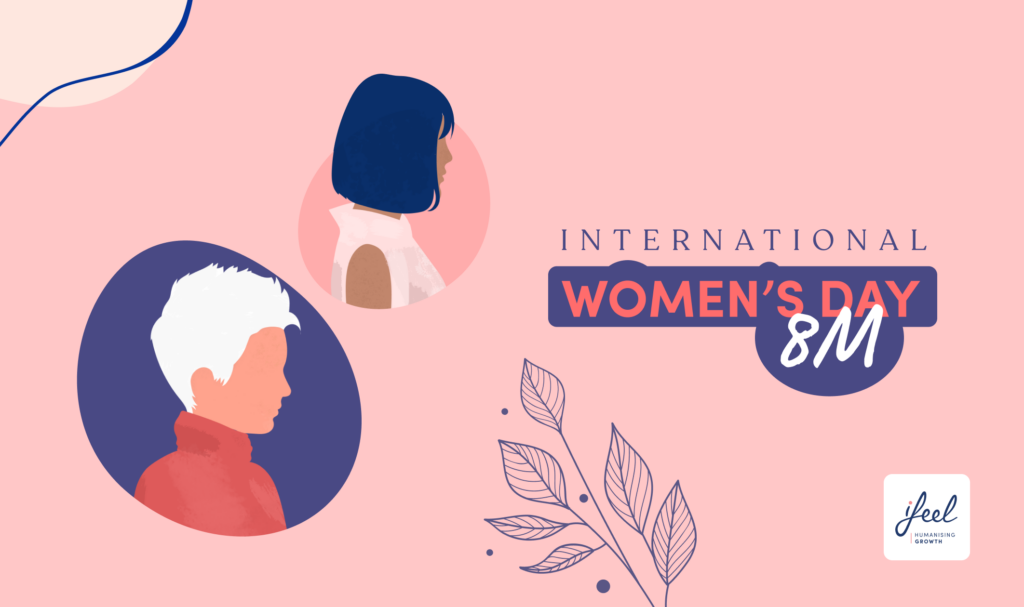Every 8th March, International Women’s Day is held to make women’s struggle for equal rights visible, emphasizing the actions needed to bring about change.
In the workplace, history has shown how women have faced different barriers and challenges, making it difficult for them to achieve corporate success. Today, although many of these obstacles are still present, the story is no longer told from an external perspective, but we have the opportunity to listen to the perspective of great women who are bringing about change from their positions.
That is why, as part of International Women’s Day, at ifeel, we have interviewed 5 outstanding women within the business world who shared their experiences, strategies, and reflections on various issues that affect women in the workplace. Read on to find out their perspective:
Barriers faced by women in the world of work
Despite cultural advances, statistics show that equal rights goals are still not being achieved. In this sense, factors such as the glass ceiling or the glass cliff are still present. This was also observed in the responses of our interviewees on this issue. We asked:
“What obstacles do you think women face in the workplace?”
Lotus Smits, CEO & Founder of The INK, shares her opinion:

Women today still face many challenges in the workplace – unfortunately, so many that I can’t cover all of them here. Over the past 8 to 10 years as a Diversity, Equity, and Inclusion (DEI) Leader, I’ve observed two recurring challenges most women struggle with:
- Bias and stereotypes, both big and small, persist in all workplaces, influencing women’s opportunities and career progression. Biases are impacting hiring decisions, promotion opportunities, and day-to-day interactions. This often results in a notable absence of women in leadership roles and fields like technology.
- Inadequate family support and flexibility policies: Research shows that women, on average, spend 14 hours more per week on household responsibilities compared to men. Many households still have outdated social norms and roles, which keeps this gap alive. The lack of family support policies, including flexible working schedules, parental leave, childcare options, and caregiving leave, makes it challenging for women to manage their professional responsibilities and personal lives effectively.
But to address the problem at its core, it’s crucial for companies to focus on policies catering to women and ensure that men are provided with opportunities for parental leave and flexibility, as this can create more balance in household and family responsibilities.
Susana Franco Herrero, Talent Development Manager at Teleperformance, provided her perspective, sharing the previous point of view:

The main challenges facing women in the workplace are overcoming the gender barriers and biases that still exist in today’s work environment. These barriers include cultural and educational components that cause women to start working with mental limitations on the possibilities for professional growth.
The famous “glass ceiling”, which, despite the progress made by society in recent years, still has a long way to go to continue to evolve. We lack women mirrors in positions of responsibility and management committees in order to make it visible that it is possible to grow professionally without losing family, friends, hobbies, and self-care along the way. Throughout our professional career, once we decide to have a family, children, and so on, we have another big challenge: it is to share the mental burden of running a home and at the same time taking care of our work responsibilities.
Nowadays, this mental burden and the tendency to self-demand that we women have makes us live exhausted to be able to get everything done. Women must manage to lower this mental burden and responsibility of being the “perfect worker” and, at the same time, the “perfect mother”.
Thanks to these statements, we can see that inequality in the work environment is mainly expressed in the existence of biases or prejudices and in the lack of work-life balance policies, which, in the end, translate into an obstacle for the professional development and promotion of women in the workplace.
The gender pay gap
Another of the main problems observed in the work environment is the existence of inequality with regard to economic conditions. This is known as the gender pay gap.
“What obstacles do you think women face when it comes to achieving equal pay?“
Suki Kaur, Global Talent Acquisition Leader, and UN Women UK Delegate, shared her views with us:
The gender pay gap is one of the most important problems we women face in the workplace. I believe it is also one of the most complicated to solve, as it is related to structural systems that have been put in place and, therefore, require much work to change.

Among the obstacles that women face in achieving equal pay are, first and foremost, the gender stereotypes and biases that surround us as women, undervaluing their contributions and limiting their access to higher-paying roles. Not to mention occupational segregation, which limits our access to higher-earning opportunities in traditionally male-dominated fields.
Additionally, Suki Kaur stressed the need to take proactive measures to reduce the gender pay gap in order to create fairer work environments. In this regard, she said:
A culture of pay transparency should be promoted to ensure that all employees, regardless of gender, are fairly compensated based on their skills, experience, and contributions to the organisation. Also, psycho-educational measures should be implemented, providing training and education to managers and decision-makers to recognise and mitigate unconscious biases that may impact compensation decisions.
Flexible work options that facilitate a balance between work and personal responsibilities should also be offered, as well as equal access to career advancement, to ensure that women have the same opportunities for career growth and pay progression as men.
“So far, what progress do you think organisations have made in relation to the gender pay gap?”
Beatriz Julian Almarcegui, Head of People at ifeel, told us:

Many advancements have been made regarding equal pay, and the fact that we are even asking this question demonstrates a level of awareness that was unthinkable years ago. Companies have become more conscious of the issue, engaged in discussions, implemented measures, and the gender pay gap is gradually narrowing.
While there is still work to be done, it’s important to recognize our progress and the opportunities available to us now that our mothers and grandmothers did not have. However, it’s crucial to understand that achieving pay equality is not solely about adjusting salaries; it involves addressing the entire ecosystem that perpetuates wage disparities.
DEI Strategy
In line with the above, awareness of the importance of achieving equality in the workplace has increased over the years. In this sense, a series of measures have been implemented and are being systematised through DEI (Diversity, Equity, and Inclusion) strategies. To find out more about this, we asked the participants:
“Which DEI policy do you consider essential for women?”
Speaking to Lotus Smits, CEO & Founder of The INK, she said:

The most essential for companies to implement are Equal Pay Policies. Unfortunately, in Europe, for every 1 euro men earn, women earn 87.3 cents for doing the same work. This translates into women working for free from mid-November until the year’s close.
We live in a society where money is a driving force behind almost everything, and therefore, Equal Pay is the first and foremost gateway to Gender Equality. Equal Pay ensures that women are financially empowered and independent to support themselves (and their families if applicable). This economic empowerment and independence is crucial for their personal development and well-being.
It’s important to start with creating Equity at the offer stage to avoid salary gaps creeping in when people enter a company. Also, connected to the half-year or yearly salary review process, an audit step should be installed to correct any salary gaps created by human biases.
Moreover, Marijana Brasiello, HRBP & OD Professional at I. B. Consulting, added:

I believe that one of the most important policies to implement within companies are those that promote a work-life balance. I realised during Covid era, for the first time, that the work-life balance is necessary (if you want to avoid burnout), and I have started to think if my values match the company and how I can improve my well-being. Overall, I understood that people need to realize that their job does not identify who they are (their quintessential being), and therefore, it is important to learn when to take a break and recharge.
The importance of recognition and support from companies
To build a healthy corporate culture, every employee must know that their work has a positive impact, both organisationally and socially. This not only motivates and increases productivity but also increases their visibility when applying for new jobs. This is why we asked our interviewees about the visibility of women in the workplace:
“Do you think women get the recognition they deserve in the workplace?”
Beatriz Julian Almarcegui, said:

Throughout my career, I have encountered brilliant and remarkable women who have been acknowledged for their contributions. However, I don’t think women’s overall societal impact and recognition is fully understood. There’s still a lack of awareness regarding the immense effort involved in balancing work responsibilities with the additional mental and cultural burdens that women often carry.
We’re only just beginning to address concepts like mental load. Yet, there’s an expectation for women to give 100% of themselves both personally and professionally, even when it’s impractical or detrimental to their health. Sometimes, we hear oversimplified statements like “Well, it’s their choice to work, or it’s their choice to have children,” which overlooks the complexities of juggling personal and professional demands and meeting basic human needs.
“Did you feel supported during your career?”
Not always, but I have felt supported by the individuals who played significant roles in my development. It’s normal to encounter people or situations along the way that may not fully embrace your ideas, but I’ve always viewed it as a part of the learning process. If my ideas are rejected, it may be because I’m not yet meeting their needs, and that’s the key to growth.
For me, invaluable support has come from my mentors, many of whom have been women. I feel incredibly fortunate to have had brilliant women in my field to learn from and look up to; they have been instrumental in my development.
“I currently feel very supported by ifeel and its founders. Through their encouragement and recognition of my work, I’ve explored new opportunities and achieved things I never imagined possible.”
Women in leadership
Despite the progress made, leadership positions still represent a scenario in which to achieve equality. Different studies have shown that women represent approximately 1 out of every 4 managers globally, and in Spain, only 6 out of every 100 CEOs are women.
These statistics show that there is still a long way to go; and are explained by the obstacles described in the previous sections and the social, economic, and psychological implications accompanying this phenomenon. In this context, taking care of women’s mental well-being plays a fundamental role.

I believe that any position, including the leadership ones, can affect mental health, especially nowadays in this fast-paced global environment. There are many helpful resources. For instance, some companies offer services that include paid psychologists, coaching sessions, sports activities, regular campaigns, workshops, and panels dedicated to numerous topics related to mental health. In general, I am glad that discussions about mental health at work are no longer taboo and that more companies are introducing effective solutions for their employees.
— expressed Marijana Brasiello, HRBP & OD Professional at I. B. Consulting
Final thoughts
“What skills have you learned or found useful in getting to the position you are in today?”

I’ve found a curious attitude to be indispensable and learning to set boundaries. I’ve learned that approaching problems with a mindset of finding solutions rather than investing time in assigning blame is essential. People notice and appreciate those who help them solve problems that affect them in the workplace.
Furthermore, the most impactful skill I’ve acquired is emotional management. Investing in self-awareness, identifying strengths and weaknesses, has made me more prudent and conscientious.
— Beatriz Julian Almarcegui, Head of People at ifeel.
“What advice would you give to other women starting out in their careers?“

I would tell her to dream high and to open her path wherever she likes with determination, respect, integrity, humility, and values but always determination. Let nothing and no one make you change your path and your purpose. That when one door closes, a thousand windows open. I would also tell him to look for places to do, try, make mistakes, succeed, and grow.
I would tell her that life is this, that she should never stay in a place where she feels small, invisible, without oxygen. She should always think that where she is will take her to where she wants to be in the future. Finally, enjoy the road and not the goal because the goal is to live, and living is not important, it is urgent.
—Susana Franco Herrero, Talent Development Manager at Teleperformance
Fostering mental well-being in organisations
At ifeel, we would thank all the women who shared their insights throughout this interview, and we reiterate our commitment to supporting and promoting gender equality in the workplace.
To support organisations, we offer a global mental well-being service for companies, designed by our team of psychologists who are experts in workplace well-being. This collaboration enables People, Talent and HR managers to receive personalised, data-driven advice on caring for the psychological well-being of the teams under their care,
If you would like more information about our mental well-being solution for companies, simply request it, and we will contact your team as soon as possible.







